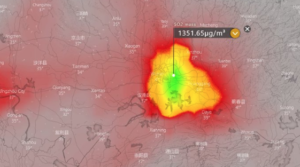- Research links air pollution with the worsening of a variety of cardiovascular and pulmonary diseases.
- Evidence suggests an association between air pollution and worse COVID-19 outcomes.
- This may account for the disproportionate effect of COVID-19 on marginalized racial and ethnic groups.
In a new literature review, researchers have outlined the evidence connecting air pollution and worse COVID-19 outcomes.
The authors of the article, which appears in the Annals of the American Thoracic Society, argue that stricter air pollution standards and taking action to end the disproportionate amount of air pollution in marginalized neighborhoods are needed.
Health inequities affect all of us differently. Visit our dedicated hub for an in-depth look at social disparities in health and what we can do to correct them.
According to the World Health Organization (WHO), 91%Trusted Source of people around the world live in a place that does not meet WHO air pollution standards.
The American Lung Association has recently found that almost half of people in the U.S. live in a county that has an unhealthy amount of air pollution — an increase from the last three reports in 2017, 2018, and 2019.
Researchers have shown that air pollution can worsen respiratory and cardiovascular diseases, reproductive issues, nervous system dysfunction, and the development of cancer.
According to the WHOTrusted Source, ambient (outdoor) air pollution kills 4.2 million people each year.
Since the beginning of the COVID-19 pandemic, researchers have explored what possible link exists between air pollution and risks associated with COVID-19.
The researchers outline the latest evidence in the current article, demonstrating a clear link between air pollution and worse COVID-19 outcomes.
According to the corresponding author of the article Dr. Stephen Andrew Mein, a physician in Beth Israel Deaconess Medical Center (BIDMC) Department of Medicine in Boston, MA, “a multitude of studies show that exposure to higher long-term ambient air pollution is associated with both increased risk of infection and death from COVID-19.”
“Historically, air pollution has been linked with worse health outcomes, including higher mortality, due to other respiratory viruses, such as influenza. Now, new research on COVID-19 adds further evidence of the adverse effects of ambient air pollution and the urgent need to address the public health crisis of pollution.”
Drawing on current research, the authors suggest several ways air pollution may worsen COVID-19 health outcomes.
Air pollution can worsen a person’s immune system, meaning they are more likely to contract a virus and more likely to have a severe infection. It can also damage the cilia in a person’s respiratory tract, which protect against respiratory infections.
Two types of air pollution — particulate matter and nitrogen dioxide — promote the creation of an enzyme that SARS-CoV-2 targets and uses for viral entry. This could account for the association between air pollution and worse COVID-19 outcomes.
The authors also note that long-term air pollution exposure can increase a person’s chances of developing cardiovascular, metabolic, or pulmonary diseases, which are themselves associated with a greater risk of dying from COVID-19.




